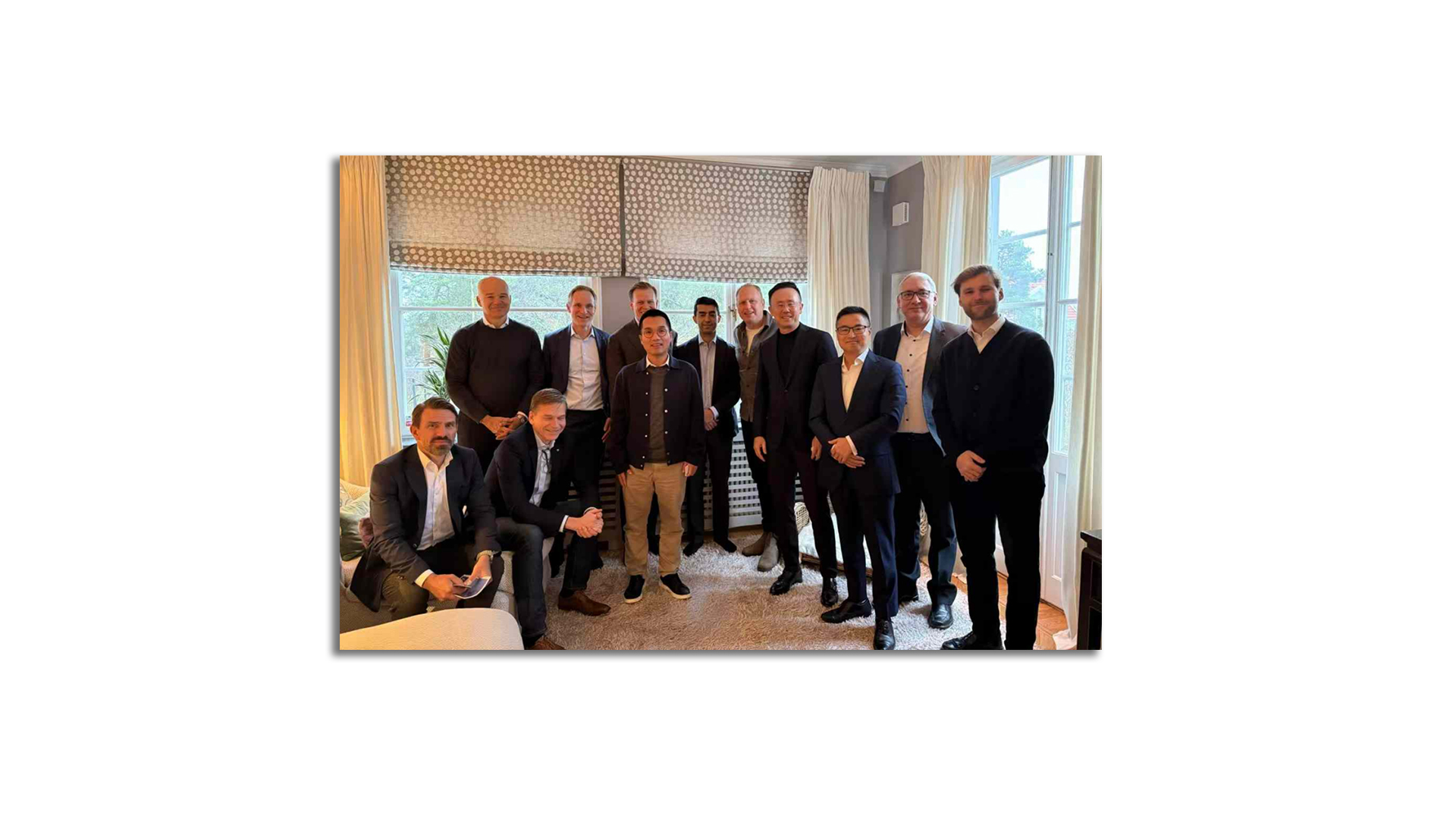Northvolt, once hailed as Europe’s largest and most promising battery manufacturer, is now grappling with the harsh reality of bankruptcy and restructuring. The company, which had been seen as a beacon of the European battery industry’s future, has cast a long shadow over the region’s confidence in its industrial ambitions.
On November 27-28, M31 Capital and McKinsey co-hosted the “Sweden and China’s Industrialization Forum” in Stockholm, bringing together key industry leaders. Among the main topics, Northvolt’s crisis took center stage. Patrick Zhong, Founding Managing Partner of M31 Capital, led a candid discussion with 60 Swedish entrepreneurs, 20 top business leaders, and world-class investors, including Masoud Homayoun, Managing Partner at EQT Infrastructure; Harald Mix, Founder of Altor PE and Chairman of Vargas Holding; Martin Lundstedt, CEO of Volvo Trucks; Christian Levin, CEO of Traton (Scania, MAN, Navistar, Sinotruck); Vagner Rego, CEO of Atlas Copco.

Northvolt’s downfall is not an isolated incident but a cautionary tale for the new energy sector and other emerging industries. While these sectors may appear to be on an upward trajectory, they often conceal critical challenges that entrepreneurs may overlook in their drive for rapid expansion.
At the forum organized by M31 Capital and McKinsey, leading entrepreneurs and world-class investors reflected on whether, in their drive for technological innovation, market expansion, and corporate growth, they had overlooked more fundamental issues such as supply chain stability, financial planning, and the ability to adapt to market changes.

On the forum, Patrick Zhong and Chinese entrepreneurs like Wu Zuyu, Chairman of Hithium Energy Storage, and Lewis Jindong Li, President of Sungrow Europe, participated in discussions and dialogues. In his keynote speech at the forum on “China’s Success in Scaling and Industrializing Green Tech Unicorns,” Patrick outlined four key aspects when discussing China: the country itself, its market, its political system, and, crucially, its entrepreneurs. Today, he invited the audience to focus on the vital role played by Chinese entrepreneurs.
From a global investor’s perspective, Patrick believes that we need to pay attention to the role of entrepreneurs and how they create value for society. He offered several key suggestions to entrepreneurs:

Trailblazers
Entrepreneurs must be trailblazers, pushing the boundaries of innovation to bring new knowledge to the world. According to Patrick Zhong, this pioneering spirit is a defining quality of today’s entrepreneurs.
In technology, this drive to innovate is especially critical. Take robotics, for example, where Chinese entrepreneurs are leading the charge in integrating mechanical engineering, electronics, software, and AI to enhance the role of robots on production lines.
The electric vehicle industry offers another compelling example of how innovation can reshape entire sectors. Entrepreneurs in this space are challenging conventional thinking, advancing everything from battery technology to autonomous driving, and in the process, reinventing transportation. This trailblazing mindset has propelled electric vehicles from a niche concept to a global phenomenon, fundamentally altering how people view mobility.
Doers
Entrepreneurs must be relentless doers, capable of executing and investing consistently. Patrick Zhong offers a telling example: While Elon Musk famously slept on the factory floor, many Chinese entrepreneurs take it a step further, living on-site and working alongside frontline workers. Great ideas remain mere concepts without the drive for execution. Truly successful entrepreneurs are both strategists and doers, with the persistence to turn abstract ideas into concrete results.
In the competitive new energy sector, speed and execution are key. Wu Zuyu, Chairman of Hithium Energy Storage, shared at the forum that rapid scaling and product iteration are crucial for competitiveness. Hithium prioritizes execution and speed, with its first factory going from planning to product release in just 9 months, and reaching full production in an average of 4 months with a 96% output rate. In just five years, it has expanded to four global factories, growing from 10 employees to over 8,000.
“Great entrepreneurs don’t just run businesses—they create values. Companies like Apple, Microsoft, and Mercedes-Benz succeed because they treat their mission with seriousness. They build brands, create products, and drive industry innovation, contributing real value to the world,” said Patrick Zhong.
Embracing Innovation and Risk
“I particularly appreciate entrepreneurs who are willing to take risks and innovate,” said Patrick Zhong. He emphasized that while the path to innovation is filled with setbacks, rapid trial and error, along with timely adjustments, are key to success.
He explained that traditional manufacturing relied on cheap labor and substantial capital investment. However, with market shifts, this model now faces unprecedented challenges—rising labor costs and the complexity of global capital flows make it harder for labor- and capital-intensive models to compete globally.
Today, innovation drives manufacturing, spanning product, process, and business model advancements. Like the “power of compounding” valued by investors, innovation creates a “compound effect” that grows over time.
However, Patrick Zhong cautioned against the idea that China’s innovation depends solely on policy support. True innovation stems from individuals who embrace challenges and take responsibility. He likened it to large language models, which initially appeared ineffective but became groundbreaking through continuous interaction and refinement—a process he calls the “black box effect”.
Patrick Zhong noted that China, with its 220 competitive sub-sectors, is a unique global player in all of them. Entrepreneurs are driving the development of these industries, similar to how a “black box” works—inputting information and, with the right system, achieving remarkable results.
“Innovation is taking us to the next stage of development, but only when hardware, software, AI, and infrastructure work together can it truly be realized.” Patrick Zhong concluded.
Focus on Trends
Entrepreneurs must possess a sharp sense of insight and stay attuned to emerging trends.
Patrick Zhong shared his investment journey as an example. At 28, he began focusing on high-growth companies, visiting over 300 annually in the U.S. and engaging with their CEOs. This experience gave him a deep understanding of investment. He later shifted his focus to China’s growing consumer market, identifying companies with global potential. Today, in his third career stage, he observes the unique global distribution of industries—AI in Silicon Valley, supply chains in China, and luxury goods in Paris—which he finds thought-provoking as an investor.
He believes the world is facing significant challenges. The 2008 global financial crisis marked the beginning of a slowdown in global growth, exacerbated by the pandemic. Despite efforts to stimulate economies through liquidity injections, their effectiveness is waning.
Patrick Zhong pointed out that many people focus too much on events rather than trends. Looking ahead, financial concerns are mounting globally—U.S. social security is projected to run out by 2035, healthcare problems loom, China’s economic growth is slowing, and Europe faces its own financial struggles.
“Entrepreneurs must develop a keen sense for both opportunities and crises in their industries, identifying trends beyond the immediate events.” he concluded.
Developing Global Market Partnerships
Patrick Zhong believes that in the past, China’s vast domestic market allowed many companies to succeed without the need to expand globally. However, with economic growth slowing and companies growing stronger, Chinese enterprises are increasingly seeking international markets. Yet, many lack understanding of local markets, regulations, and systems, which hinders their integration into foreign ecosystems.
He emphasized the importance of developing global partnerships. These partnerships provide critical knowledge, technology, and insights into local markets and industry systems. Whether it’s European companies entering China through joint ventures or Chinese companies expanding internationally, such collaborations create long-term value for both sides. History shows that specialization and division of labor are the foundations of global economic growth. Companies must leverage their strengths and cooperate to drive growth.
Lewis Jindong Li, President of Sungrow Europe, also highlighted how Sungrow promotes globalization through R&D, localization, and partnerships. The company has six global R&D centers and plans to establish a software and AOT center in Germany. Sungrow is also creating a comprehensive renewable energy ecosystem by collaborating with partners in Europe, the U.S., and Australia to meet future energy demands efficiently.
“We are facing the challenge of re-globalization,” Patrick Zhong said, “Growth is the key to solving many global issues, and achieving it requires greater cross-cultural and cross-regional cooperation. By bringing together the brightest minds to address real challenges, we can create unprecedented solutions and lay a stronger foundation for the future.”

